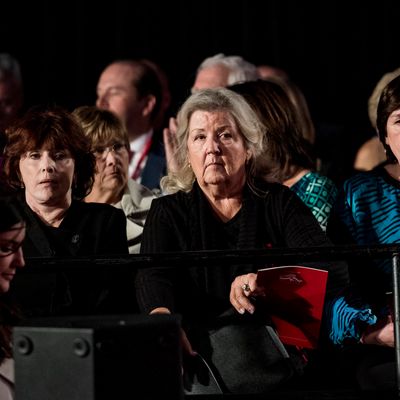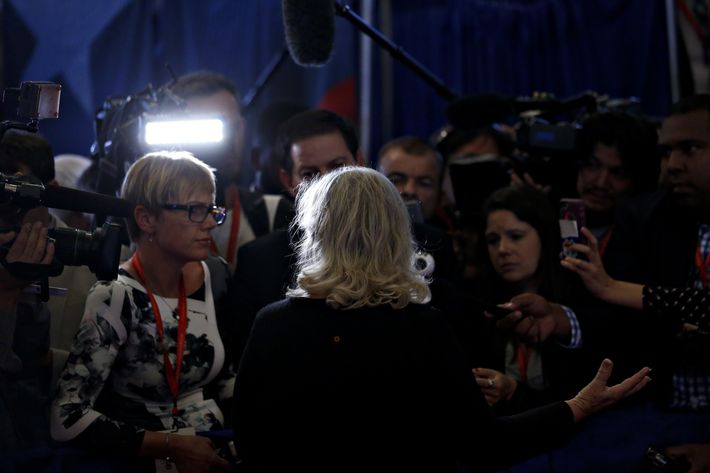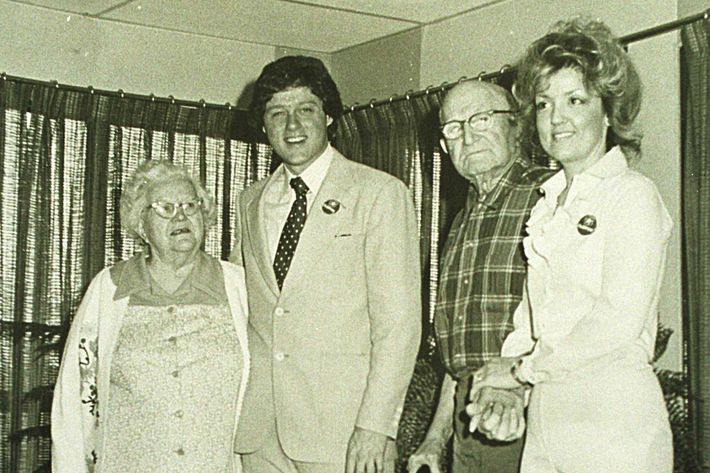
Juanita Broaddrick had almost given up by the time she called her grandson from her house in Van Buren, Arkansas, on January 6, 2016. She had been trying, since seeing a video in late November, to send a single tweet, with no success. Her grandson, Ridge, then 13, diagnosed the problem immediately.
“Nana, are there red numbers at the bottom?” Broaddrick remembers him asking. When Broaddrick said yes, he explained this meant that the message was over the maximum 140 characters then allowed by Twitter. Broaddrick didn’t tell Ridge what she was trying to tweet when he gave her the quick lesson. After staring at the pared-down message on her screen for more than 30 minutes, Broaddrick finally hit send, saying what she had been trying to say for over a month:
This wasn’t the first time Broaddrick had made this claim. In February 1999, she appeared on NBC’s Dateline, in an extensive and emotional interview with Lisa Myers. Broaddrick described the alleged rape, which she said had taken place in a Little Rock hotel room, when she was a nursing-home operator and a volunteer in Bill Clinton’s campaign for governor. Clinton had relocated a scheduled lobby-coffee-shop meeting at the last minute, saying it was too noisy for the planned conversation about nursing-home reform. Despite appearing on national television, Broaddrick remained a relatively obscure figure in 1999 — unlike Monica Lewinsky, whose story had come out the year before. Indeed, it had been Monica Lewinsky’s story that finally compelled Broaddrick to come forward.
NOW president Patricia Ireland issued a statement that called Broaddrick’s account “compelling” and asked Clinton’s defenders to refrain from smearing the accuser, but Ireland was one of very few high-profile liberals to show her any respect. Clinton aides like James Carville and Betsey Wright, and even as feminist icons like Gloria Steinem and Betty Friedan, had already gone on the offensive against other women who had accused Bill Clinton of sexual harassment.
Broaddrick’s tweet and public support for Donald Trump brought her story back into the spotlight, and the ongoing reckoning over sexual abuse and harassment has kept it there. Daily Intelligencer talked to Broaddrick in a series of interviews about feminism, the Clintons, the #MeToo movement, Roy Moore, and why she decided to go to the second presidential debate as a guest of Donald Trump.
The following transcript has been edited and condensed for clarity and length. Additional parts of the interview, including Broaddrick’s account of her sexual assault, can be heard here.
Did any feminists or feminist organizations reach out to you or support you at the time?
No. Not one. I was so disappointed, you know. And then I just, I just tried to forget it. You know, you sit there and you think day after day, week after week, month after month. Why don’t they support me. Why don’t they at least pick up the phone and call and ask to talk to me.
What is your relationship with feminism? Did you ever consider yourself a feminist?
I guess in a way I did from being a women’s-majority-stockholder business. But I didn’t feel like a true feminist. I went along with how I was raised, that women should be in their places, and it’s taken me a while to get over that.
I do have strong feelings about the feminists and them not coming to me when my story aired. Not one feminist group ever contacted me to judge my story for themselves. They ignored me.They wanted nothing to do with me, nothing. And I know why.
Back then they had the cooperation of the Clinton White House and did not want to endanger any of their prospective legislation that they wanted to put through.
You once said to me, “Feminists failed me, but they didn’t fail a lot of other women because they got a lot of legislation passed.”
Yeah. And you know I hope that what they did for women’s rights brought us women to a better existence … I just hate that they threw me and the other victims of Bill Clinton under the bus to do it. I used to think that you can sacrifice a few for the many. But you know, you and I have talked over the past few days and I’ve come to another realization. I wonder how many of the women and children and men would not have been raped or sexually assaulted over the last two decades if these women’s groups had just done the right thing and denounced Bill Clinton. Instead, it brought us to this society of accepting Bill Clinton’s transgressions. That’s wrong. How many less victims would there be had he been removed from office for what he did?
Your story resurfaced during the 2016 primary when you responded to Hillary Clinton’s statement that women had the right to be heard.
Yes. Well, Hillary came out with this statement and it was on the news and she said every victim has “the right to be heard … and to be believed” and … I could not believe that that was coming out of her mouth.
So I had been on Twitter a couple of years before, but I really didn’t know how to use it, so I never used it. I think I tweeted something one time about “well I’m on my porch having coffee.” [Laughs] And that’s really interesting.
Right. Everybody wants to hear that.
I sat down and I thought, I’ve got to answer this. And that’s when I sent out the tweet that, you know, went viral about being raped by Bill Clinton. And I had to have the help of my grandson because I kept getting too many words in it and Twitter wouldn’t allow it to go through. So he walked me through what to do even though he did not know what I was tweeting. And so I tweeted, you ready? “I was 35 years old when Bill Clinton, Ark. Attorney General raped me and Hillary tried to silence me. I am now 73….it never goes away.”
I punched tweet and all hell broke loose. I mean, this is a story that’s been out there for decades, but I guess I didn’t realize the power of Twitter. My phone was ringing off the wall, with reporters wanting interviews and my son called me and said, “What have you done?”
Then Hillary Clinton removed the statement from her website that said women have the right to be believed.
Yeah, after my tweet. I just didn’t realize the power in the words that you put on Twitter. I wish Twitter had been around in 1999 right when I did the Dateline interview.

What made you endorse Trump?
I became a Trump supporter late in the campaign. And when people ask, “Why did you support a man such as Trump,” I say, “Donald Trump gave Bill Clinton’s victims a voice that we had been denied for two decades.” And they say, “Well, why did you go to that debate?” Well, I had been told for two decades to go back in the woodwork, I didn’t matter. So here was my opportunity to be heard in a huge public forum. I just couldn’t have imagined that happening to me after all these years. And people say, “Do you feel used by the campaign?” I don’t know what I feel. I just feel glad that I had that opportunity to bring this to view again. You know, if we were used, I don’t care. Whatever his reasons were when he asked us to the second debate, I thought I would finally be able to tell my story to millions of people who had never heard it before. That’s why I went.
In other words, he may have done it for political reasons. He may not care. But he still provided an opportunity for you to tell a story that you’d been unable to tell for all these years.
Right. I thought it was important not only because of Hillary running but because who she would take to the White House with her.
And did telling your story there give you any relief?
Oh my goodness, yes. That was the best experience of my life. We had no idea that that press conference was going to take place. We were taken by Trump’s hotel on the way to the debate and told he wanted to meet us. We went up to a large room with all kinds of refreshments and we waited for him to come. He came in and graciously talked to us and told us how sorry he was for what we’d been through. And then all of a sudden we were ushered into this room next to the large room and here’s this long table. And we were told where to sit, Kathleen and Paula and Kathy Shelton and I. We all looked at each other and we followed their orders because we didn’t know what we were doing in there. And so in a few minutes, Mr. Trump came in again. I heard him say, “You can let them in.” We had no idea what he was talking about. Then all of a sudden the doors open and here come all these cameras and reporters. And we all looked as shocked as those reporters, who were looking back at us. And then all of a sudden Mr. Trump says, “These ladies perhaps have something they would like to say.” We had no idea … I am thinking that somebody was supposed to tell us and forgot or they were possibly afraid that we wouldn’t do it.
So, it was all off the cuff for you?
Yep. But I’m happy I did it. I’d do it all over again.
Some people who are sympathetic to your story and believe you are still surprised and disturbed that you supported Trump because he himself has been accused of rape and sexual assault. What’s your response to that?
I know that people came forward after the second debate. And they came out again recently. I know nothing about these cases. The only one I know about is my own rape. But they have the right to be heard.
What if you had learned Trump had raped someone. Or what if someone who sounded as credible as you do had accused him of rape? Would that have changed anything?
I would not have supported him if I had heard anybody had come forward with what I came forward with and what I experienced.
Some people who supported Hillary Clinton in the primary and general of course are criticizing Bill Clinton for the first time. Senator Gillibrand, and writers like Matt Yglesias, for example, now say that Bill Clinton should have resigned over Monica Lewinsky. Why do you think that is?
Their bravery comes up now, when the Clintons have lost their power.
They mention Lewinsky but not you. Why do you think that is?
It’s like they are tiptoeing into the abyss and can’t quite reach me yet. Hopefully they will in time. Maybe they still don’t believe it happened or maybe it’s just too hard to imagine. That is their right. But I do still feel vindicated by those who have admitted they were wrong so many years ago about me.
Michelle Goldberg, for example, is another journalist who supported Hillary Clinton but has mentioned your case. She wrote an op-ed at the New York Times called “I Believe Juanita.” What do you think caused someone like Goldberg to write this?
Some of those that did come forward did surprise me. It’s hard to know why. I’d like to think that those people truly believe me. But after you go through decades of being harassed and ridiculed you have to wonder where they’re coming from now and what their motive is. It does please me to hear them say that. But I want people to be sincere. I don’t want them to come forward and say I believe her because this is what my political party wants me to do. I want them to say it because they truly feel and they know that it’s the right thing to do. If she was sincere, I commend her for her comments.
Lots of media on the right asked you to comment on Roy Moore ahead of the Alabama Senate race in December. What are your thoughts on him and the allegations against him?
You know, I think that all of those victims have the right to be heard. But I also believe they should have to go through all of the intense scrutiny that I had to go through. That’s only fair.
But do you think the intense scrutiny of you was fair?
They were unfair but not because of the scrutiny. After I was scrutinized to the point that I was, they didn’t believe that it was true. That was my problem with the media. You know, with Roy Moore, I give the benefit of the doubt to a victim because I am one. I honestly think history will prove that the Roy Moore allegations brought out how the Democrats will protect the Democrats and Republicans will protect the Republicans. And that’s just not the way that it should be. You shouldn’t care whether it’s a Democrat or Republican if someone has a valid allegation. And I think that this just came to a head when Chris Hayes tweeted what he did. That started a new awakening.
Speaking of a new awakening, what are your thoughts on #MeToo?
It’s positive and such an interesting story, how it evolved ten years ago with one little girl wanting to tell someone what was happening to her. After all the revelations of Weinstein, Alyssa Milano revived it and because of her star status it caught on. It’s a very good thing. Women and girls, men and boys who had been silent for so long could, in one instant, come forward. The movement of course could not answer to each individual of the thousands who came forward but it brought awareness.
As you know, Time magazine made the Person of the Year the silence-breakers from the #MeToo movement. Time had asked you before they made their selection for a comment on the movement.
I was happy to do that. I thought those women were brave. When I found out they had been chosen as Time’s Person of the Year, I was happy and looked for my comments.
But they weren’t there. Do want to share the comment that Time did not include?
“It’s a different time now. Women aren’t taking it anymore. For decades we were told “men will be men, just deal with it.” Now these allegations are being brought to a level playing field and victims deserve the respect to be heard. It is a revolution that we must be careful not to allow the pendulum to swing to any extreme until the investigative process is completed.”
You’ve expressed hurt and anger about feminist groups ignoring your story. Going forward, is there anything they could do to bridge the divide you feel? Is there anything you’d want them to say?
Say they were wrong. Say they should not have had such a close liaison with the Clintons, and that they should have done the right thing.
What do you think the important lessons from your story are?
What I think that we can learn from all of this is that all people regardless of sex, regardless of anything, have the right to say no and expect to be treated accordingly. But when no’s not taken for an answer, then victims must be heard loud and clear.

Some people who find your story credible find it hard to understand why you hold Hillary Clinton responsible in any way. [Other than feeling] like Hillary made a threatening statement to you in 1978 at an event for Bill, what else do you hold against [her] in terms of enabling?
After the “in person” threat to me in 1978, I took special note of how Hillary treated other victims of her husband in the years that followed. She referred to victims of her husband and male colleagues as “whiny women” and waged an all-out war on any woman who came forward or were rumored to have allegations not favorable to her family’s political goals. This is why I remained silent until I was outed by the Paula Jones lawsuit.
Were you surprised by the recent revelations that Hillary Clinton had not fired an adviser [Burns Strider]who had been accused of sexual harassment, even though her own campaign manager recommended he be fired?
Hillary Clinton’s actions of protecting her male staffer [Burns Strider] accused of sexually harassing a young female staffer did not surprise me. Hillary’s relationship with this man as a faith adviser was important to her personally. Therefore, the young woman’s degrading assaults took a back seat to Hillary’s own needs. Just because Hillary is a woman does not automatically translate her championing other women, especially if it does not fit her agenda.
I truly wonder how all the feminists will spin their continuing support of Hillary Clinton when they discover she sold us all down the river for her own personal and political aspirations.
And what else do you want us to know about you and your thinking?
You know, somebody asked me recently what am I proud of. And if I should go to my grave right this minute, what would I regret the most. I’m proud of my son. And my grandson. And the one thing I’m afraid of is that I will go to my grave without forgiving Bill Clinton. It’s just something that I can’t do. My pastor has asked if we need to pray about this, if there is something we need to do to give me peace. And I, just, I’m not there.





























